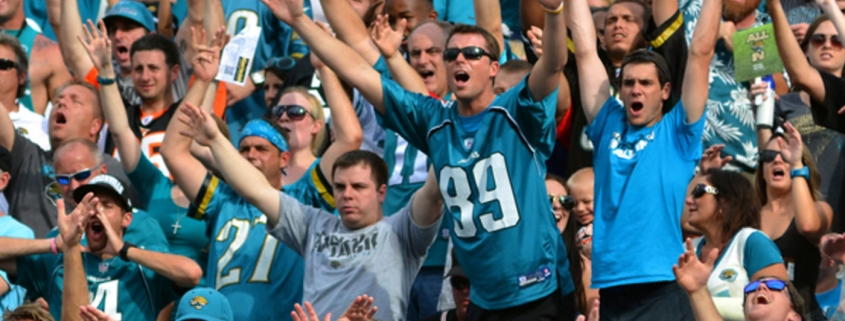Can a Whole Town Have a Hangover?
Is it possible for an entire city to have a hangover for a whole week? It sure seemed like it last Sunday when the Jaguars took on the Tennessee Titans at the stadium.
The week before, the Jaguars, with huge vocal support from their fans, exorcized the demon Patriots, the only thing standing between them and the Super Bowl last season. Last Sunday, it seems everybody, including the Jaguars players themselves, never could shake the fog from the previous week’s celebration.
“There wasn’t as much at stake, so there wasn’t that same emotional connection,” Dr. Tracy Alloway, an Associate Professor of Psychology at the University of North Florida and a Jacksonville resident explained.
But wait, the stakes WERE high. A division game, at home, against a hated rival. Those ARE high stakes.
“It’s the stakes that are perceived” Dr. Alloway explained. “You need a starter group, a primer to create what’s called ‘emotional contagion’. The news, social media, all that creates a sense of community. We didn’t perceive the Titans game as important as the Patriots game, so there wasn’t that frenzy, no priming effect.”
So somehow, in theory, the message didn’t get out that the Titans game was big. I know the energy wasn’t there in the stadium, in the stands or on the field. The whole thing felt flat.
“Entire organizations can have their own adrenaline,” said Frank Palmieri MSW, a Licensed Clinical Social Worker in Jacksonville and a Jaguars fan observed, “There’s an association people have with their sports team. You identify with them. This city has been more and more associated with the Jaguars.”
So it is possible that the team and the fans were still in a bit of a celebration fog from the week before. And when Doug Marrone says he can do a better job getting the team ready, and when the players say they need to get themselves ready for these kinds of games, we should believe them.
“It’s easy to play great when you feel great and it’s easy to play poorly when you feel down,” Palmieri explained. “The key is to play well when you feel poorly.”
That seems obvious, but it does start to explain, in theory, what happened. Palmieri asked the key question, “What happened after the first couple of series when things didn’t go their way. Were there some injuries guys were playing with? Did the Titans recognize that? What were they thinking.”
It is pretty rare that teams can overcome an early slide. When things go wrong in the first couple of drives, they seemed to compound themselves over four quarters.
Not a coincidence says Dr. Alloway.
“Studies have shown that for the team itself, emotional contagion can go both ways,” she explained. “If they miss a play early, they can’t break out of that funk. It’s because of the emotional contagion that flows through the entire team.”
That’s why when there are great comebacks in games its unusual and celebrated. It usually starts with a exceptional individual performance, or some “jump start” that changes what’s happening on the field. None of that happened against Tennessee.
“Every week going out to compete at the highest level has it’s own set of problems,” Palmieri, a two-time National Champion as part of the Pershing Rifle Drill team at Seton Hall explained. “The emotional and mental preparation just to get to the performance takes it’s own toll.”
I asked Dr. Alloway how teams and fans could break out of that funk.
“It’s the coaches job to “prime” the players and give them the stakes that are involved. Research shows emotional contagion plays a big role in how teams perform.”
Which means fiery halftime speeches could actually work!
And when you hear players say, “Just one good drive, one good play,” or when they jump up and point after a seemingly meaningless first down, that also can work.
“When players would celebrate their successes, studies show that also impacted the performance of the other players,” Dr. Alloway explained. “Positive reinforcement is a big factor in the emotional state of the players while the contest is going on. Even self-affirmation can give players a lift during the game.”
If last week the euphoria of beating the Patriots impaired everybody’s ability to get up for the Titans, what does a loss to Tennessee do?
“You see it all the time in college towns,” Palmieri explained. “It’s almost like grief when your team loses. There’s denial and disbelief. Sometimes there’s anger directed at the coaches or the team itself.”
“Studies show that from a fans perspective, losing has been associated with excess food consumption, reckless driving and problems in the home,” Dr. Alloway added. “It has a big effect on us.”
So as fans, don’t be mad at the team, don’t eat too much, drive carefully and control your emotions.
Because now I understand the game plan for victory: Start with the perfect “Win one for the Gipper” motivational speech before the game from the coach. Have the players telling themselves and teammates they’re doing a good job. Be sure fans are telling each other how important the upcoming game is on social media.
Or.
They could just play better.




